

From: Berhane Habtemariam (Berhane.Habtemariam@gmx.de)
Date: Tue Mar 02 2010 - 07:27:04 EST
Experiences Of A Freedom Fighter In Operation Fenkil
Written by Samrawit Efrem |
02/03/2010
http://www.shabait.com/images/stories/000samri1.jpgHer name is Elsa
Habtemichael, but she is more commonly known by her nick name Jinubi. Lt.
Colonel Elsa joined the Eritrean armed struggle for independence in 1978
during the strategic withdrawal. Being one of the many brave freedom
fighters who participated in the Operation Fenkil, Jinubi conducted an
interview regarding her experience in the historic war. Excerpts follow:
Q: Tell us how you joined the armed struggle?
A: There were freedom fighters in our village and I was actively involved
with mass organizations even before I fully understand the concept and cause
of the struggle. Later on I came to realize that it won't be easy to achieve
independence and ensure social justice. So I decided to join the armed
struggle during the strategic withdrawal, 1978. I was assigned to 70th
division following military training.
Q: How did you gain your nick name, Jinubi?
As soon as I joined the armed struggle, a martyred comrade gave me the
nickname, probably because I was tall, dark and skinny, resembling a lot
like the people of Southern Sudan.
Q: If you had not become a fighter what kind of life would you have been
leading right now?
Like my fellow villagers I would have become a farmer's wife with children,
or gone aboard. I would never have been the Elsa that I am now, a former
freedom fighter who speaks out for the rights of women.
Q: As you were one of the participants of Operation Fenkil, can you tell us
your perspective of it?
Fenkil literally means to uproot something from its core. Every aspect of
Fenkil Operation was executed according to detailed and sophisticated
planning. The freedom fighters' devotion enabled them to perform
unbelievable heroic feats during the war. Even enemy forces were forced to
express admiration to the perfection of the Operation.
Q: What was your personal experience in the Operation?
The division I was in was in Asosa, Ethiopia, during the week the operation
was to be executed. Then we arrived in Mai'ule around She'ib area and at
that time we were told that we were going to carry out the maneuver.
Operation Fenkil began at 1 a.m and an attack was launched based on detailed
studies including that of weather conditions and well-drafted strategic
plan. The offensive was launched with full confidence and everybody was
convinced that victory was inevitable.
Q: A number of women fighters participated leading their units in this
particular war, isn't it unusual to let women take a leading role in major
operations such as Fenkil?
http://www.shabait.com/images/stories/000-samri.jpgNever, female fighters
have been able to prove their competence in pervious major wars. So there
was no doubt regarding the women fighters' abilities. They were captains,
lieutenants, corporals. and won many battles along their male counterparts.
Q: Can you describe the experience of crossing the sea at night on a
small boat?
You don't expect any good thing to happen in moments like that. The place
was very narrow and we were injured the minute we went onboard. On land you
can fight hand in hand but on sea you don't know what is going to happen the
next minute. You can perish without accomplishing anything. The performance
of the EPLF naval forces was beyond words can express. These valiant
fighters didn't take any special training to accomplish this, only their
commitment and bravery enabled them to do the undoable.
Seeing freedom fighters on small boats swiftly rolling under the giant ships
and attacking them, it is confusing to see who is being hunted by whom. On
the 14th of February a US ship came to the aid of Ethiopian forces, but was
compelled to run back when chased by the small boats of the EPLF.
Q: Where you ever afraid for your life during the whole operation?
http://www.shabait.com/images/stories/000samri2.jpgIt is unthinkable to feel
time and there is not even time for such thoughts. The fear was not about
whether you would be scarified or not, but whether you would fall without
fulfilling your objective.
Q: What did you do after Operation Fenkil?
I moved towards the highland areas and I was nine months pregnant. Until
the end I fought and lead a battle. I was the first freedom fighter to
deliver in Mekane-Hiwet hospital- now Orrota. Many people came to visit me
in the hospital; I guess they never saw a freedom fighter having a baby.
Thank You!
Translated by Samrawit Efrem
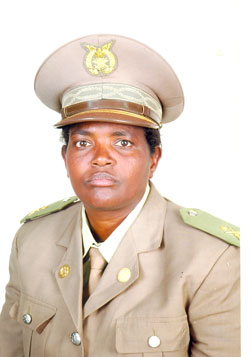
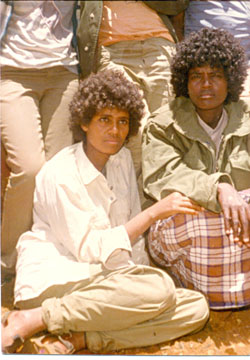
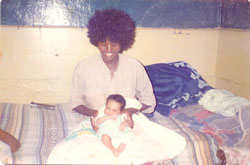
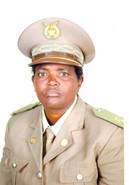
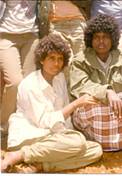
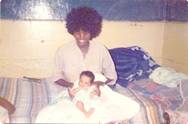
----[This List to be used for Eritrea Related News Only]----
